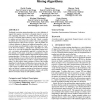Free Online Productivity Tools
i2Speak
i2Symbol
i2OCR
iTex2Img
iWeb2Print
iWeb2Shot
i2Type
iPdf2Split
iPdf2Merge
i2Bopomofo
i2Arabic
i2Style
i2Image
i2PDF
iLatex2Rtf
Sci2ools
133
click to vote
KDD
2008
ACM
2008
ACM
Quantitative evaluation of approximate frequent pattern mining algorithms
Traditional association mining algorithms use a strict definition of support that requires every item in a frequent itemset to occur in each supporting transaction. In real-life datasets, this limits the recovery of frequent itemset patterns as they are fragmented due to random noise and other errors in the data. Hence, a number of methods have been proposed recently to discover approximate frequent itemsets in the presence of noise. These algorithms use a relaxed definition of support and additional parameters, such as row and column error thresholds to allow some degree of "error" in the discovered patterns. Though these algorithms have been shown to be successful in finding the approximate frequent itemsets, a systematic and quantitative approach to evaluate them has been lacking. In this paper, we propose a comprehensive evaluation framework to compare different approximate frequent pattern mining algorithms. The key idea is to select the optimal parameters for each algo...
Approximate Frequent Itemsets | Approximate Frequent Pattern | Data Mining | KDD 2008 | Pattern Mining Algorithms |
Related Content
| Added | 30 Nov 2009 |
| Updated | 30 Nov 2009 |
| Type | Conference |
| Year | 2008 |
| Where | KDD |
| Authors | Rohit Gupta, Gang Fang, Blayne Field, Michael Steinbach, Vipin Kumar |
Comments (0)

